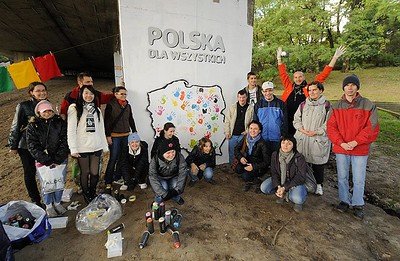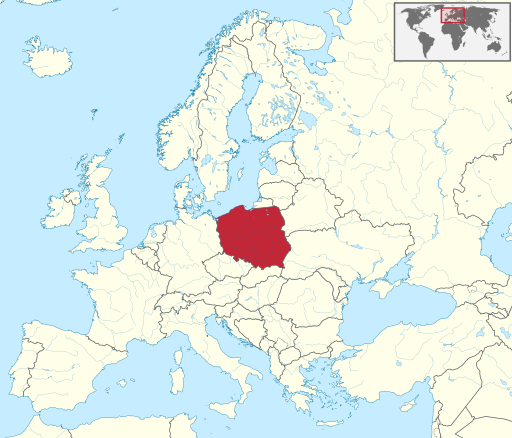Start of the political changes in Poland, studies on children's behavior by @papi.mati
Intro
This article is the second part of the triptych on the political situation in Poland (read the first part here). It presents notes from 2015, when, as every year, I worked as an animator in one of the luxury hotels on the Baltic Sea. At that time, the populist government of "Law and Justice" had already won the elections and took over the state media. They started an Islamophobic and xenophobic campaign with help of the church and TV. They created an imaginary enemy against whom they could "protect the nation". Such measures are typical of all undemocratic governments that try to unite voters in a besieged fortress and convince them that voting for their party is the only way to maintain security and state integrity.
Although the situation in Poland has only worsened since then, I think that work was the greatest pedagogical challenge for me. It was associated with many moments in which I tried to educate children about diversity, risking a confrontation with parents and the employer (luckily she shared my views).
Start of the political changes in Poland, studies on children's behavior
 source - the leader of Law and Justice party. Even though he is not a prime minister neither president, he is the one who unofficially makes the most important decisions in the country, avoiding taking responsibility in the future for any of them
source - the leader of Law and Justice party. Even though he is not a prime minister neither president, he is the one who unofficially makes the most important decisions in the country, avoiding taking responsibility in the future for any of them I have noticed a tremendous change between the views of the children I was working with then and those three, four, and five years ago when I was an animator at the same hotel. This change was terrifying.
I omit such gems as children repeatedly shouting at others "you are sinning!" when they do something wrong. A few years ago, these words were replaced with the usual neutral "you are naughty" or "I'll tell your mom about it!". Well ... it's a small change and, although heavily saturated with religiosity, rather harmless. The most important is that they could distinguish good behavior from bad behavior, and whether they explain it to themselves by angels looking down at them should no longer interest me.
I am intimidated by much more dangerous words, and there were plenty of these that season. Before I will describe the most important one, let me quote a few smaller ones:
"I don't celebrate Halloween because I would spend eternity in hell"
Zuzia, 7 years old"Who were you rooting for during the last match? Germany? But Germany is Satan. Germany triggered World War II"
Weronika, 7 years old"Turn off this cartoon. It is not Polish!"
Zuzia, 7 years old“-We're going to church today because on Sunday we will be on the way home. Will you be in the church?
-No, I won't.
-Why?!
-because I don't believe in God. Some people do not believe in God and some do. Those who believe in God go to churches, mosques, synagogues, and other temples, and those who do not believe stay at home.
-not true! Everyone has to go to church! "
Bartek, 8 years old"Kids, what is in this crossword puzzle made by Mr. Mateusz? (read) human comes from there ... well, I guess not from a monkey! People say so, but it is lies and nonsense!"
Old lady on the bench, second creationist I have met my whole life.
There were many, many more. I explained to myself that the Baltic Sea attracts specific holidaymakers to a large extent. Of course, without generalizing, many of these people are terrified of going abroad, meeting with foreign cultures, closed to learning about other ways of life. Especially that a two-week stay here, where I am, costs easily as much as a trip to the Maldives or Madagascar.
In those cases, I was trying to explain, and correct views distorted by parents, the media, and society. Certainly, children do not always accept my explanation that the world may be different from what they think, but at least they have the opportunity to clash with a different point of view. Who knows? Perhaps for the first time in their life. After all, we surround ourselves with people who think similarly (social bubble theory) ...
The hardest thing for me was to talk to six-year-old Antoś. The conversation took place a few days ago, during painting in the playroom, on the break between classes. Antoś admitted that he has two thick history books at home and that he loves history, which I praised of course.
He wanted to paint a swastika.
I decided that forbidding him that might be incomprehensible, so I chose a different form of reaction - a polite conversation with Antoś himself, but also indirectly with other kids who only knew about the history of the 20th century that there was someone like Hitler.
 source - Poles protesting against racism
source - Poles protesting against racism "Antoś: It will be a swastika on such a red band. The Nazis had such.
Me: What do you know about Hitler?
Matylda (8): He was German. The Germans killed everyone because the Germans are bad.
Me: Not really. It cannot be said that any nation is good or bad. Individual people are bad and good. It was the German Reich, not present Germany, and I guarantee you that none of the people who were killed at that time is no longer alive.
Antoś: Hitler was very bad. He killed Jews and attacked Poland.
Me: Very good, that's right. You have to be careful because when you paint a swastika, someone might think you like Hitler.
Antoś: I don't like him very much, but I like history. Then I'll make this R and anchor headband and it'll be good.
Me: P, not R. This stamp means "Fighting Poland"
<< moment of silence when everyone is painting >>
Antoś: Sir, did Poland win or lose then?
Me: It was a world war, so not only Poles and the German Reich fought. Almost the whole world fought. Hitler was defeated, but in fact, no one ever wins in wars.
Antoś: I like history very much, but I didn't know that.
Me: It's very good that you like history. History can teach us a lot and prevent us from making the same mistakes. Thanks to this, perhaps such a Hitler will never appear in the world again.
Antoś: I would very much like him not to show up here. Just let him appear where there is Islam.
<<< and here a cold shiver ran through me >>>
Me: Why do you say that?
Antoś: Because the Islamic State is bad and it also kills people.
Me: ISIS is bad. They are terrorists who do a lot of wrong things, but not all who believe in Islam are in ISIS.
Antoś: How is it?
Me: There are many countries where people believe in Islam. Also, some people live in Europe and believe in Allah. The vast majority of them are good.
Antoś: But they kill, so you have to kill them
Me: No. You mustn't think that way. That's what Hitler thought. He did not like the faith of the Jews and he wanted to kill them. If you will not like Islam to the point where you want to kill people, you'll be like Hitler. You will only exchange one faith for another. Again, not every Muslim is bad, not every one of them is a member of ISIS
Antoś: But they said differently on television. Then why do they say on TV that Islam is bad? "
And at that moment I did not know how to easily explain these complexities to a child.
One thing is certain: in the absence of a parent-child conversation, or only in a laconic, occasional conversation, we put our children at great risk.
 source survey made after the populist xenophobic campaign presenting what Poles are thinking about Islam. 75,4% criticize it, 65,8% is afraid of it, 50,4% sees danger in it and 49,2% says that Islam brings endangerment of terrorism
source survey made after the populist xenophobic campaign presenting what Poles are thinking about Islam. 75,4% criticize it, 65,8% is afraid of it, 50,4% sees danger in it and 49,2% says that Islam brings endangerment of terrorism Children absorb knowledge and are not always able to distinguish media mush, propaganda needed solely for political purposes, from the truth. We created our Polish hell by constant shifting the media to the right and left (or actually to the right and even greater right), politicians use harsh words because they attract attention and prey on the fears of the less educated part of society, which has never met with "others" and willingly demonizes it. We forget, however, that there are still children who absorb everything like sponges - with redoubled strength.
These children will often adopt the language of aggression later. They consider it neutral because it surrounds them from an early age. They will also look for stronger stimuli that attract attention and allow them to stand out. They will go a step further, and there aren't many steps left.
I did not sleep well that night.
Summary
In today's Poland, threatening immigrants and Islam is not so common anymore. With time, the Law and Justice government entered into a political marriage with the Catholic Church, introducing a law that was sometimes much more restrictive than Sharia, so the continued use of Islamophobia was pointless and would look comical. LGBT people have become the main national enemy, but once awakened xenophobic demons do not die quickly. The hatred was sown in the hearts of many Poles, and unfortunately, lives its own life. Wearing a burqa, or even having a slightly darker skin color, which would indicate Middle Eastern origin, may be associated with the risk of verbal or physical attack on the streets of Polish cities, especially in the east of the country.
I would like to believe that the homeland that I still love, although I am not able to continue living in it due to my own beliefs and my sexual orientation, will someday change and Poland will be an open, tolerant country, but realistically looking at the current situation and further perspectives, I think it is impossible, at least in the nearest future.
The third part of the triptych, about the campaign against LGBT people and the Polish Stonewall, will be published tomorrow.
Thank you for reading,
@papi.mati

Thank you for sharing in Writing and Reviews! We appreciate a lot your engagement with this community.
We’d love to hear more from you!!